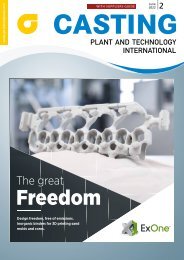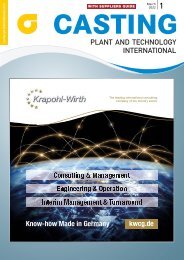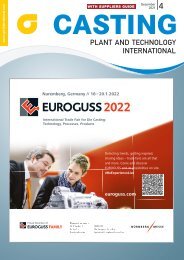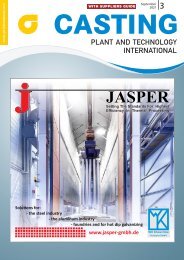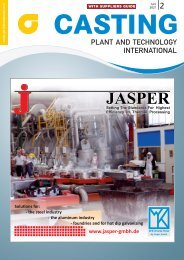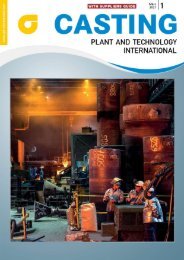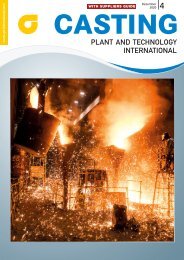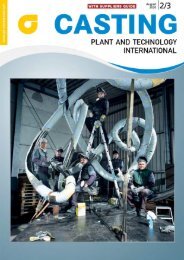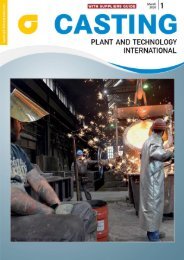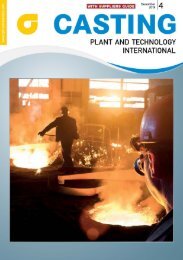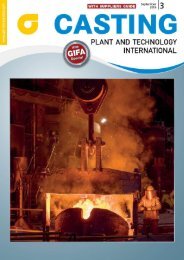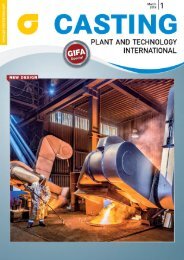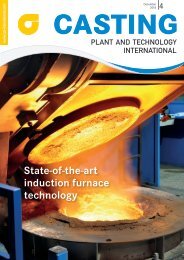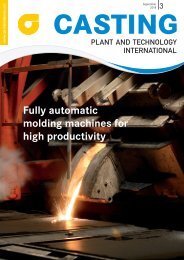CPT International 02/2019
- No tags were found...
Create successful ePaper yourself
Turn your PDF publications into a flip-book with our unique Google optimized e-Paper software.
FILTECH<br />
October 22 – 24, <strong>2019</strong><br />
Cologne – Germany<br />
The Filtration Event<br />
www.Filtech.de<br />
SPECIAL: GIFA <strong>2019</strong><br />
ASK Chemicals uses<br />
its own technical<br />
center to increase<br />
the effectiveness of<br />
the products, thus<br />
providing users with<br />
added value such as:<br />
lower resource consumption.<br />
Photo: ASK Chemicals<br />
Platform<br />
for your<br />
success<br />
Targeted<br />
Solutions<br />
for the<br />
Casting<br />
Industry<br />
Your Contact: Suzanne Abetz<br />
E-mail: info@filtech.de<br />
40<br />
Phone: +49 (0)2132 93 57 60<br />
country that is being used in series production”.<br />
The advantages for customers: considerable<br />
time and money is saved in the<br />
production of prototypes and spare<br />
parts. In addition to this, process reliability<br />
is increased by the elimination of<br />
core assembly, while designers are enthusiastic<br />
about the unlimited design<br />
potential. There are many different<br />
application areas for the castings, which<br />
weigh between 100 and 1,000 kg. Heinrich<br />
lists them: “They are used in lorries,<br />
construction equipment, agriculture and<br />
forestry management, solar farms and<br />
wind turbines, rolling stock, machine<br />
manufacturing in general and hydraulics,<br />
our new product segment”. BDG<br />
executive Troglio summarizes: “Such<br />
technologies can help to save a great<br />
deal of time and energy when tooling is<br />
being built, particularly where prototypes<br />
and short series are concerned”.<br />
Products with greater impact<br />
The progress that has been made with<br />
organic bonding agents and the use of<br />
inorganic bonding agents of the kind<br />
developed by, for example, foundry<br />
supplier ASK Chemicals, Hilden, Germany,<br />
also improves environmental performance.<br />
Dr. Jens Müller, Research and<br />
Development Manager at ASK Chemicals,<br />
explains: “We are focusing primarily<br />
on increasing the impact of our products<br />
and on generating added value<br />
for our customers, as – for example –<br />
material input can be decreased and<br />
the total potential emissions can be<br />
reduced as a consequence.”<br />
The company has succeeded in<br />
developing the first unmarked phenolic<br />
resin in the world for the cold box process<br />
in iron casting. A hazardous product<br />
is therefore not needed in this process.<br />
Müller adds: “There are other<br />
advantages apart from the environmental<br />
benefits: The particularly high reactivity<br />
of this new system makes it possible<br />
to reduce bonding agent and catalyst<br />
volumes in many cases.”<br />
Inorganic bonding systems are becoming<br />
increasingly important in aluminium<br />
casting. ASK Chemicals is also<br />
noticing greater awareness of sustainable<br />
products. Müller thinks that “this is<br />
certainly driven by the fact that the<br />
general conditions in Europe particularly<br />
have become more demanding<br />
due to the implementation of relevant<br />
regulations” and is therefore delighted<br />
that product developments for protection<br />
of the environment are successful<br />
above and beyond this too: “Initially,<br />
no-one really believed that the technology<br />
of inorganic bonding systems<br />
would replace conventional processes.<br />
This may be attributable to the fact that<br />
there are technological and economic<br />
benefits in addition to the original<br />
environmental aspect. Now it is an established<br />
feature in lightweight metal<br />
permanent casting.“<br />
Environmental, economic, social Sustainability<br />
cannot, after all, always be<br />
considered solely at the environmental<br />
level. Elke Radtke, who is responsible<br />
for environmental protection as well as<br />
occupational health and safety at BDG,<br />
also thinks that “sustainability involves<br />
economic and social action too. As an<br />
association, we provide information<br />
about the regulations that affect the<br />
foundry industry. Our observation is<br />
that legal regulations designed to protect<br />
the environment often fail in particular<br />
to take social and economic factors<br />
into sufficient account. Wherever<br />
appropriate, small and medium-sized<br />
companies especially also need to be<br />
able to adapt processes and take advantage<br />
of new technologies. Because operations<br />
that are not economic lead in<br />
the long run to failure, which in turn<br />
jeopardizes jobs. That is not sustainable<br />
at the social level.”




